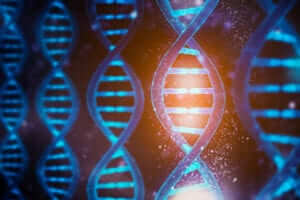Around 1 in 6 children–toddlers included–experience mental health issues (1). In many cases, their condition is severe enough that it impacts daily activities, and places much stress on concerned parents.
As parents, we’re proactive and responsive about taking care of our children. When they have a cold, we give fluids and rest. When they break a bone? We mend it. And when they have a cut or a scrape, we patch it right up.
But what about the things that don’t present themselves with things we can see? What if, instead, they alter behavior, temperament, and learning?
Recognizing signs and symptoms, and intervening with holistic treatment swiftly ensures you and your little ones get the support you need to heal the underlying issues that are at the root of many common mental health issues in our kids.
Identifying Mental Health Issues
You know your child, and you know what their “normal” is. This is one of the most important times to listen to your instincts as a parent and advocate for your child if you feel something needs to be addressed. How do you know if your child has mental health issues?
Signs and symptoms of mental health disorders in children include:
- Difficulty learning or concentrating at school

- Lashing out at friends or family
- Frequent mood swings
- Intense emotional outbursts (fear, anger, anxiety)
- Bullying
- Withdrawing from friends, peers
- Refusing food
- Depressive symptoms, apathy
- Talks of suicide or attempts to self-harm (2)
Holistic Mental Health
Just as in adults, the state of a child’s mental health exists on a spectrum. Part of becoming a well-adjusted adult is learning how to manage strong emotions, such as anger, sadness and frustration.
Children develop outlets for managing feelings often based on the examples set by their family and siblings, but often need direction and structure when the demands on their emotional capacity exceed their abilities.
Treating Root Causes of Mental Health with Integrative Medicine and Functional Medicine
It’s of utmost importance to focus on supporting a child’s developing brain by bridging the gap between their individual chemistry, education, and cognitive development. Conventional medicine often separates these components during interventional therapies–but an integrative approach treats the whole body, from brain to body and beyond.
Our program, Brain Boost addresses gut function, toxicity, brain chemistry, and behavior to help your child reach their full potential.
The best place to start healing mental health is to identify possible triggers to behavior and attention troubles.
One of the foundational components that must be addressed when looking at underlying causes is nutrition. Nutritional deficiencies, including low b vitamins, low vitamins d and a deficiency of healthy fats all contribute to blocking a child’s learning potential.
Besides nutritional deficiencies, other factors may contribute to the inability to focus, including hormone imbalances, digestive disorders, toxicity and chronic stress.
For example, overgrowth of unfriendly organisms in the gut, like candida, is another possible trigger. Numerous studies have also shown a strong link between childhood behavioral problems and learning disabilities and exposure to toxins or heavy metals (3).
Genetics and Mental Health in Children
Sensory processing disorders, and other mental health conditions may have a genetic component, although this doesn’t make them an exception to holistic therapies, in fact, it demands a more holistic approach to provide the body with what genetic tendencies may ignore. Children with sensory issues are hyper-responsive to light, sound, touch, or other  stimuli–and their reactions also exist on a spectrum. On one end, they may scream or vomit in response to touch, or they may simply express discomfort.
stimuli–and their reactions also exist on a spectrum. On one end, they may scream or vomit in response to touch, or they may simply express discomfort.
As with other conditions with a genetic component (autoimmunity, etc.) our environment dictates much of symptom management.
A low-sugar diet rich in quality protein (naturally-raised meats, and eggs), healthy fats (avocados, olive oil, coconut) and fiber-rich vegetables is an important foundation to support healthy expression of genetic factors that impact mental health (4).
Artificial Additives and Hyperactivity
Prepackaged foods, especially the ones marketed toward children, are notoriously full of artificial flavors, colors, and preservatives. Additives like these have long been suspected to at least aggravate, if not cause, hyperactivity.
A recent study in the journal Pediatrics, found that children with the highest levels of pesticide metabolites present in the body were most at risk for attention-deficit/hyperactivity disorder, or ADHD (5).
While there isn’t one source of artificial additives or pesticides, there are small steps we can take to reduce our kids’ exposure to these compounds.
- Don’t bring home junk food from the store.
- Prepare simple, easy healthy snacks in advance like cheese sticks, organic fruit, nuts, or organic vegetables dipped in hummus or dressing.
- Be a good role model–let them follow your healthy eating habits.
- Be persistent–never underestimate the impact of small, consistent changes over time.
Childhood Anxiety
First, it’s important to remember that children are receptive and sensitive, and often pick up on subtle behavior changes in the adults around them. That being said, if your child displays the above symptoms and you’ve recently experienced trauma, such as a death, divorce, or other event–it’s important to support them no matter the root cause of their symptoms.
Anxiety in children, as in adults, can come from many different places, and be a combination of different factors. One component may be the continued reinforcement of unhealthy patterns of thoughts, in addition to overactive communication of excitatory brain messengers, for example.
We can work to enhance the brain’s neuroplasticity by strengthening healthier thought pathways and coping mechanisms, in addition to providing calming support through diet and targeted supplements.
Essential fatty acids, or EFA’s–specifically EPA and DHA are critical for supporting the brain. These special fats are found mainly in fatty fish and fish oil, and liver–all foods children do not tend to consume in abundance. EFA deficiency is correlated with poor behavior and attention problems (6).
EPA and DHA support gut health and the proper development of brain tissue and communication of brain cells.
Magnesium is another common nutrient deficiency in children who struggle with anxiety and hyperactivity. One study found that 72% of children tested and who had ADHD were deficient in this calming mineral (7).
GABA, which is a neurotransmitter produced from the amino acid L-glutamine helps to balance more excitatory neurotransmitters, and plays a role in concentration (8).
Mental Health & Holistic Wellness for Brain Health
The chemistry of our brain is an immensely complex system. Neurotransmitters produced in the gut communicate via the vagus nerve to stimulate impulses in the brain to communicate hormonal signals, receptors, and nervous system function.
Along this one example of communication, there are many cells and signals that must be functioning properly to ensure healthy brain function. These cells and signals require nutrients from our diet to be able to do their job.
The Gut as the Second Brain
Healing the brain must begin with a nourishing diet, and when nutrient deficiencies are present, therapeutic doses of nutrients are crucial for better brain function. This is where working with an integrative practitioner while testing for nutrient deficiencies is of great importance.
Further, it’s almost impossible to get all the necessary brain nutrients while eating the standard American diet.
Nutrients that protect the brain from free radical damage and inflammation, and support the body’s production of neurotransmitters are paramount for good learning and behavior.
Dysbiosis
When treating anxiety symptoms, sensory issues, or ADHD, good bacteria naturally present in the digestive system need to be enhanced. Brain function can be influenced by dysbiosis, which is an overgrowth of unwanted bacteria in the intestines, and an absence of the beneficial bacteria.
This imbalance can be promoted by the use of antibiotics, which often destroy the good bacteria while simultaneously destroying the bad. When the average child undergoes multiple courses of antibiotics typically before they reach age 5, this can set the stage for bacteria imbalance.
Because neurotransmitters, like serotonin, dopamin, and GABA are produced in the gut, ensuring healthy gut bacteria also supports mood and cognition in children.
In dysbiosis, the resulting overgrowth of yeast and other pathogenic bacteria has been linked to altered immune function, food sensitivities, and behavior problems (9).
Autoimmune Triggers
Pediatric Autoimmune Neuropsychiatric disorders associated with Streptococcal infection–or PANDAS, is presumed to be a rare disorder but affects up to 1 in 200 kids, suggesting it’s prevalence isn’t as rare as once thought (10).
PANDAS results from the body’s immune system attacking bacteria cells that cleverly mimic the body’s own tissues. Because of this, the immune system not only attacks the bacteria, but similar-looking cells in the heart, brain, skin, or joints. What results is an almost overnight and drastic change in behavior.
Children may develop any number of tics, OCD behavior, or become defiant and moody. Overnight bed-wetting, irritability, or ADHD symptoms may appear as well (11).
PANDAS onset generally occurs in children from age 3 to puberty, and is often misdiagnosed.
Integrative practitioners understand the multi-faceted approach required to treat PANDAS, when many conventional practitioners aren’t yet familiar with its complex symptoms.
Integrative Treatment for Mental Wellness
Mental health and overall wellness are closely linked. Cognitive development and brain health are a delicate balance of emotional well-being, proper nutrition, and genetics–all of which integrative medicine supports during comprehensive diagnostics and treatment.
CentreSpringMD provides the unique Brain Boost program to identify and correct nutrient deficiencies, toxin exposure, and gut function to ensure your child can reach their full cognitive potential. True wellness combines integrative treatment modalities to address the health of their whole person, not just a combination of symptoms.
Learn more about Brain Boost here.
Resources
- https://www.aafp.org/news/health-of-the-public/20190318childmentalillness.html
- https://www.psychologytoday.com/us/blog/singletons/201609/13-signs-potential-mental-illness-in-child
- https://www.ncbi.nlm.nih.gov/pmc/articles/PMC5333623/
- https://www.ncbi.nlm.nih.gov/pmc/articles/PMC3598224/
- https://www.ncbi.nlm.nih.gov/pmc/articles/PMC3706632/
- https://www.sciencedirect.com/science/article/abs/pii/0031938495022074
- https://www.sciencedirect.com/science/article/pii/S1110863015000555
- https://www.ncbi.nlm.nih.gov/pubmed/16971751
- https://www.ncbi.nlm.nih.gov/pmc/articles/PMC4879184
- http://pandasnetwork.org/statistics/
- https://www.nimh.nih.gov/health/publications/pandas/index.shtml

